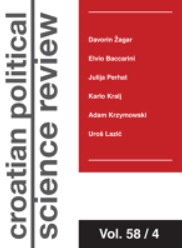ŠTO JE TO POSTIMPERIJALNA SUVERENOST? UZ NOMOS ZEMLJE – CARL SCHMITT I KRITIČKO ČITANJE HANNE ARENDT
WHAT IS POST-IMPERIAL SOVEREIGNTY? ABOUT THE NOMOS OF THE EARTH – CARL SCHMITT AND CRITICAL READING BY HANNAH ARENDT
Author(s): Žarko PaićSubject(s): Political Philosophy, Political history, Political behavior, Politics and law, Comparative politics, Geopolitics, Peace and Conflict Studies
Published by: Fakultet političkih znanosti u Zagrebu
Keywords: Post-imperial Sovereignty; Schmitt; Arendt; The Nomos of the Earth; Political Theology; Neo-imperialism;
Summary/Abstract: In the article, the author analyzes Carl Schmitt’s book The Nomos of the Earth by asking how, after the nation-state era and the collapse of European imperialism, which was also the starting point of Hannah Arendt’s Origins of Totalitarianism, the conditions for the possibility of political action are established, since this action no longer has for its existential space the idea of rootedness in the nation as a state with mechanisms for the protection of sovereignty with the help of legislative, executive and judicial power enshrined in the constitution. Power is not just a state-social logic of managing a fixed space and a limited nation-state territory, as was customary from the 18th century in Europe until the end of World War I. Schmitt in the second period of his philosophical and legal thought, formally and substantively after the end of World War II, saw the political and politics as the universal geopolitics of the “large space” (Großraum). The existential-decisionist turn proves to be the main reason why Schmitt’s notion of the political cannot be declared a justification for any dictatorship or totalitarianism. The decision rests on an empty centre of freedom, not a power. The Nomos of the Earth in the post-national constellation for Schmitt thus becomes a matter of order and spatializing in the conquest and appropriation of land in constant wars and conflicts with the Other, because man is anything but good by nature. A critique of this position in the marginals of Hannah Arendt alongside Schmitt’s book The Nomos of the Earth opens up the possibility of discussing the limits of neo-imperialism and the new legal-political constitution of the world after World War II. The author claims that the result of this aporetic and paradoxical situation in the 21st century lies precisely in the so-called post-imperial sovereignty as a continuation of Schmitt’s postulate of the state of exception on a global-planetary level. The political precedes politics as the new nomos of the Earth requires a turn in the notion of the relationship of freedom and power.
Journal: Politička Misao
- Issue Year: LVIII/2021
- Issue No: 03
- Page Range: 77-104
- Page Count: 28
- Language: Croatian

